Equity, Diversity, and Inclusion Strategy 2022-25
The Johnson Shoyama Graduate School's EDI Strategy is aligned with the school's Strategic Plan and complements the University of Saskatchewan’s Equity, Diversity, and Inclusion Policy and the University of Regina 2020-2025 Strategic Plan, All Our Relations | kahkiyaw kiwâhkômâkaninawak, focus on Well-Being and Belonging.
As part of our commitment to preparing public sector professionals for career success, the Johnson Shoyama Graduate School of Public Policy (JSGS) has developed strong EDI policies and practices that will help us in modelling the way for future policy leaders to confront 21st-century policy challenges.
Public sector professionals need to use inclusive practices to define and solve policy challenges. This includes having the skills to work with diverse groups, understanding stakeholder interests and positions, and dealing with conflict constructively to make progress on issues that matter to the stakeholders they serve.
At JSGS, we welcome the opportunity to work collectively within the school and across our two institutions to move forward toward our desired outcomes. As part of our efforts, we are leveraging the diversity of our faculty, staff and student body to ensure that we can create positive change within our School and progress within society. We also welcome people into our spaces and teams, bring people and experiences together, and create a conciliatory environment. We see our differences as a strength and appreciate the diversity within our teams.
At JSGS, we strive to ensure that our people feel a sense of belonging and that they have the knowledge and skills necessary to work effectively with others.
JSGS is located on both Treaty 4 and Treaty 6 Territories, the original lands of the Cree, Ojibwe, Saulteaux, Dakota, Lakota and Nakota and the traditional homeland of the Métis. We pay our respect to the First Nations and Métis ancestors of this place and reaffirm our relationship with one another.
As a School, we approach issues of decolonization, reconciliation, Indigenization, equity, diversity, and inclusion with a spirit of humility, purpose, and commitment. We strive to be respectful and patient with ourselves and each other and to embrace constant learning and improvement. We are continuously working to build and maintain a community in which individuals feel respected and valued.
JSGS EDI Committee Members
The JSGS EDI Committee serves to inform, coordinate, and prompt efforts across the School to advance equity, diversity, and inclusivity in JSGS’s work, learning, and outreach environments and activities. The committee features representation from JSGS faculty, staff, Executives-in-Residence, and students, and includes members from Indigenous, racialized, and LGBTQ+ communities.
The committee includes two working groups:
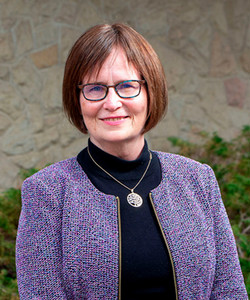 |
Martha Smith, JSGS Acting Executive Director, USask campus Martha is a professor and academic leader with decades of leadership experience in roles such as Interim and Acting Associate Dean in the College of Graduate and Postdoctoral Studies. She has made lasting contributions in the community and to the city of Saskatoon through volunteer roles with community outreach organization, OUTSaskatoon and was recognized with the 2022 RBC KnockOUT Award.
|
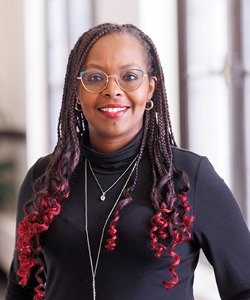 |
Sadia McInnes, JSGS Director of Finance and Administration (Team Lead) Originally from Kenya, Sadia immigrated to Canada in 2006, first as an international graduate student, and later as an employee of the University of Regina. She holds a Master of Science in Mathematics from the University of Regina, and MCert in Public Management from JSGS URegina campus. She has been with the JSGS school as Faculty Administrator since January 2022. Sadia is passionate about ensuring a safe, inclusive, and respectful working and learning environment that celebrates diversity, promotes empathy, and fosters mutual respect and community. |
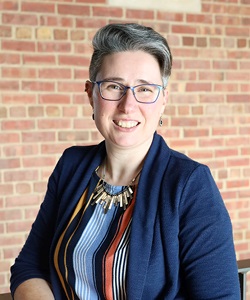 |
Karen Jaster-Laforge, JSGS Community Engagement Coordinator Karen Jaster-Laforge enjoys connecting the JSGS community with speakers interested in sharing their knowledge through JSGS’s public lectures and events, including the EDI Discussion Series. In her spare time, Karen enjoys being outdoors, camping, spending time with her family, and volunteering. |
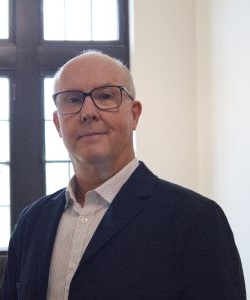 |
Sheldon Green, Director of Executive Education, JSGS U of R campus (he/him) Sheldon joined JSGS after a 34-year career in public service, bringing deep experience in inclusive policy and community development. During his two decades with the Government of Saskatchewan, he held senior management roles focused on government relations as well as Indigenous, First Nations, Métis, and Northern Affairs. Sheldon has been recognized for his leadership and commitment to service with the Queen Elizabeth II Platinum Jubilee Medal and the Saskatchewan Premier’s Award for Excellence in the Public Service.
|
 |
Emmy Neuls, Manager of Graduate Programs (Distance Delivery) Having moved to Saskatchewan as an international student from Norway, Emmy knows first-hand how international experiences can mold an individual’s perspective in terms of academic research and outlook on life. She has spent her career providing opportunities for students and faculty to expand their learning experiences to include an international and Indigenous perspective. As part of her work, she has been very fortunate to collaborate with both the University of Saskatchewan and UiT the Arctic University of Norway, and with community partners, to develop and maintain an international program and partnership that can have a true impact on the community level. |
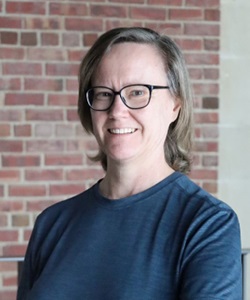 |
Tamela Friesen, JSGS Student Recruitment and Event Coordinator
|
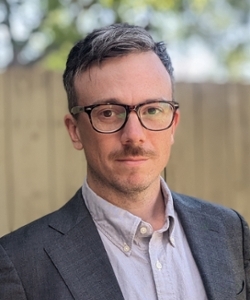 |
Daniel Dickson, JSGS Faculty Member, USask campus A political scientist by training and a care worker by experience, Daniel's research focuses on the potential of social policy to disrupt patterns of discrimination and barriers to inclusion. He has a PhD in Political Science from Concordia University and was a SSHRC postdoctoral fellow in the School of Political Studies at the University of Ottawa.
|
 |
Kurtis Boyer, JSGS Faculty Member, USask campus Kurtis Boyer is a citizen of the Métis Nation-Saskatchewan and is a political scientist working in the areas of Indigenous governance and political psychology. Originally from Southern Saskatchewan, in 2018 Kurtis completed his Ph.D. in Political Science from the University of Lund in Sweden. |
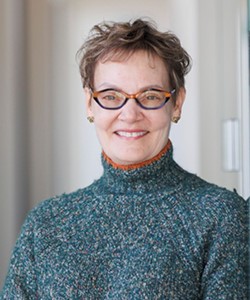 |
Margot Hurlbert, JSGS Faculty Member, U of R campus Margot A. Hurlbert is a Canada Research Chair, Tear II, in Climate Change, Energy and Sustainability Policy. Margot was born in Kinistino, Saskatchewan, and is a graduate of the University of Regina, with law degrees from Osgoode Hall Law School, York University, and a Ph.D. from the University of Amsterdam. |
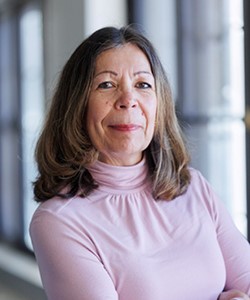 |
Danette Starblanket, JSGS Faculty Member, U of R campus An urban member of the Star Blanket Cree Nation in Treaty 4 Territory, Danette Starblanket has extensive experience as an educator and First Nations civil servant, offering insights on treaties and Indigenous politics. She has taught Indigenous Studies courses at First Nations University of Canada (FNUniv), Women and Gender Studies courses at the U of R, and Political Science courses at both the U of R and University of Saskatchewan (USask). |
JSGS EDI Guiding Principles
As we embark on implementing our EDI Strategy, JSGS will be guided by the following principles to ensure that we can build a better environment for our entire community.
- To remain committed to evaluating our: A) operations, spaces, teams, B) outreach initiatives, and C) programs and research, in regard to upholding evidence-based principles for equity, diversity, and inclusion actions.
- To establish a welcoming environment for all faculty, Executives-in-Residence, staff, students, researchers, partners, and visitors. To create spaces (physical and online) that are safe by giving respect to, and learning from, all persons that engage with the academic and executive education units.
- To assess and act, as is necessary, in order to address our internal barriers (explicit and unconscious) and inequities. By acknowledging systemic barriers, we are better able to advance institutional equity, diversity, and inclusion actions. This includes addressing barriers faced by, but not limited to, women, Indigenous Peoples, newcomers to Canada, neurodiverse individuals, persons with different accessibility needs, racialized groups, and members of LGBTQ2S+ communities.
- To understand that equity, diversity, inclusion, and a sense of belonging will strengthen our communities and are vital to achieving excellence, innovation, and creativity in all domains.
- To be humble and be led to reconciliation practises by engaging and sustaining partnerships with First Nations, Métis and Inuit Peoples and their community members, Nations, and organisations.
- To develop a JSGS EDI Strategy, via the EDI committee, including an action plan and measures of effectiveness. After the Joint Faculty Council (JFC) approves the EDI Strategy for implementation, the EDI Committee will provide information regularly to the JFC on the School’s progress.
- To demonstrate commitment and accountability for progress on EDI strategy and the EDI environment of the school. A report will be given to the JSGS Executive Committee and to the JSGS Joint Faculty Council to review every second year. Reporting will include progress on the development and implementation of the EDI Strategy and Action Plan, as well as other initiatives and findings of the committee.
- To ensure issues of institutional and individual safety, privacy, trust, belonging, and power differentials are recognized and proactively addressed; this is most successful when those impacted are directly engaged in defining the issues and actions.
Teams, Operations, and Spaces
Desired Outcomes and Actions Steps
| DESIRED OUTCOMES | ACTION STEPS TO GET THERE |
| Hiring processes (including student research assistant, intern, postdoctoral, staff, faculty, researcher, and executive in residence) are conducted with EDI awareness and lens. |
|
| Our JSGS team reflects our diverse community (local, national, international). |
|
| Our JSGS team continues to advance its knowledge regarding EDI. |
|
| Our JSGS team appreciates and understands the unique socio-cultural position of Indigenous Peoples in Canada. |
|
| JSGS advisory committees (i.e., voluntary groups established to provide strategic feedback to JSGS) include a representation of diverse lived experiences. |
|
| Online spaces are inclusive, accessible, and welcoming. |
|
| Physical spaces are inclusive, accessible, and welcoming. |
|
Outreach
Desired Outcomes and Actions Steps
| DESIRED OUTCOME | ACTION STEPS TO GET THERE |
| Public-facing images are representative of our socially and culturally diverse population. |
|
| Publications, websites, and social media use inclusive and non-discriminatory language and meet accessibility standards (such as Web Content Accessibility Guidelines). |
|
|
Email signatures and business cards reflect consistent, school-wide JSGS identity and commitment to EDI. Email signatures include a land-based acknowledgement. |
|
| Authors and speakers reflect a diverse audience with aspirational targets set based on the demographics of Saskatchewan. |
|
| Feedback surveys seek evidence of diversity, equity and inclusivity. |
|
Programs and Research
Desired Outcomes and Actions Steps
| DESIRED OUTCOME | ACTION STEPS TO GET THERE |
| Make equal gender representation in our literature lists a priority (when appropriate to the class). |
|
| All content dealing with Indigenous peoples accurately reflect the distinction of each Indigenous group in Canada (First Nation, Inuit and Métis) and have each group represented. |
|
| Acknowledge neurodiversity and make this reflective in efforts to have the different learning styles of students. |
|
| Students appreciate and understand the history and the unique socio-cultural position of Indigenous Peoples in Canada. |
|
| Support Indigenous students by identifying, and removing barriers for accessing funding. |
|
| Improve the accessibility of the syllabus template. |
|
| Instructors review and incorporate, whenever applicable, EDI guidelines for online spaces. |
|
| Our student body reflects our diverse communities (local, national, international). |
|
| Admissions and scholarship processes are conducted with EDI awareness and lens. |
|
| Scholarship recipients represent our diverse community. |
|
| Research incorporates EDI principles, which reflects Tri-Council statement on EDI. |
|
| Ensure that Elders and Keepers of Indigenous knowledge play a role in supporting, conducting ceremony, mediating conflict, providing local context and history to programs and research. |
|
| Graduate research students consider if there are EDI dimensions to their thesis/dissertation. |
|
| Graduating students are prepared to advance EDI principles in their workplaces. |
|

